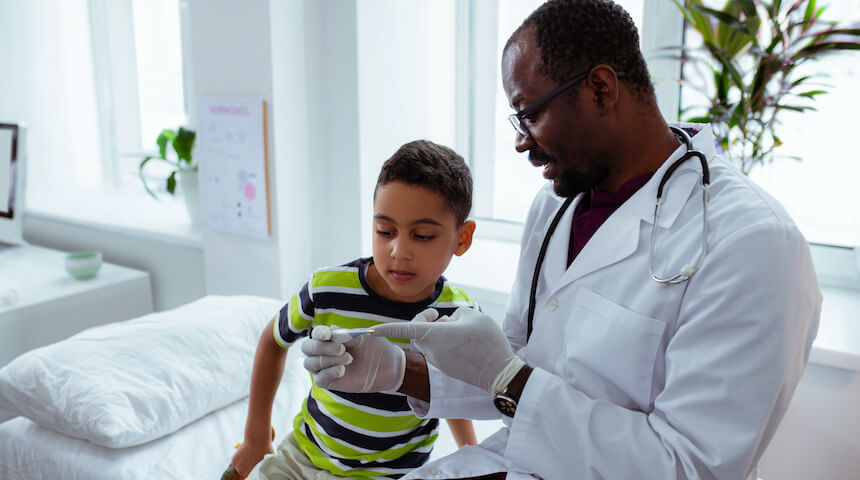Let’s be honest: Going to the doctor can make anyone nervous. For children, the visits can be even more scary. But parents are the first line of defense in dealing with childhood medical anxiety. Every time your child visits the doctor, there’s an opportunity to make it a positive experience.
Discover Why Your Child Is Nervous
Medical anxiety is when a child becomes nervous about seeing a doctor or going to the hospital. This type of anxiety can be caused by a previous experience or fear of the unknown.
The first step in addressing your child’s medical anxiety is recognizing behavioral changes around the time of medical treatment.
Like adults, children have symptoms associated with medical anxiety. Both physical and emotional symptoms can help you understand what’s driving your child’s fear.
Emotional symptoms can include:
-
Excessive talking
-
Irritability
-
Anger
-
Silence
-
Worry
Physical symptoms can include:
-
Upset stomach
-
Sweaty palms
-
Fatigue
-
Restlessness
-
Trouble sleeping
Any of these changes may suggest your child is struggling with medical anxiety.
How to Calm Medical Anxiety
Like with many other behaviors, children learn from watching their parents. When faced with medical anxiety, your child will watch to see if you are also showing signs of anxiety. If you are calm, share your sense of peace with your child. If you are worried, confess this feeling and work with your child to feel more relaxed together. Here are few suggestions:
-
Take deep breaths together. First, show your child how to do a slow, deep inhale and then pretend to blow out birthday candles. If you can make breathing distracting and fun (and even a little silly), you’ve shifted the focus away from the anxious feelings.
-
Hold hands. A trusted adult’s touch can be calming. This simple reassurance reminds our child we are present and fully focused on the concerning situation. Fears are less frightening when we know we don’t have to face them alone.
-
Talk about a happy memory. The most useful memory to recall is when your child overcame a difficult situation with a positive result. Remind your child about a time when they succeeded on a big test or made a new friend. These types of resilient, happy memories will fuel the courage to face future challenges.
-
Tell your story. Children love hearing about a time when you were scared and how you managed the situation. It can be a story from childhood or an example from your adult life. Be sure to explain how you felt with humor and honesty and share how you dealt with those feelings.
-
Play a game. Engaging your child’s mind can help distract from the feelings of anxiety. A simple game (like how many items in this room are yellow?) can remove pressure from the situation.
-
Be honest. If your child asks about an appointment or procedure, be honest about what to expect. This direct approach to dealing with medical anxiety can help sort realistic fears from unrealistic ones. Offer to answer questions to help your child learn more about the situation.
Talk with a Professional
When you suspect your child is struggling with medical anxiety, talk with your child’s doctor. With a younger child, share your child’s concerns, what you have noticed and how you are dealing with it as a family. With an older child, it is important to include the child in your discussion with the doctor.
Encouraging your child to share openly with the doctor will allow everyone to hear the full extent of the problem. If your child’s medical anxiety begins to interfere with daily life, partner with your doctor to create a more comprehensive plan to address your child’s anxiety together.
Are You Interested in Learning More?
Sign up for our e-newsletter for more tips and best practices from pediatricians.
Sign Up Here









